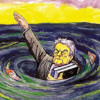 Home: Blog: 2013-07-19 Homophobiology
Home: Blog: 2013-07-19 Homophobiology
A reply to "What is Marriage?" by Sherif Girgis, Robert George, & Ryan T. Anderson
Homophobiology
[ho-mo-fo-bee-ol-o-jee]
The objective, philosophical & scientific basis for discriminating against poofs.
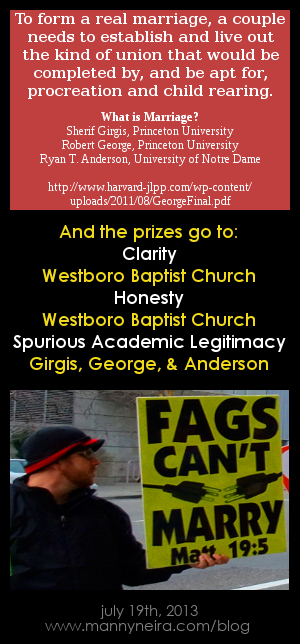 The philosophical method of modern Christian fundamentalism involves more than simply swallowing the Bible whole and regurgitating its ancient meanderings as fact, as in "Darwin was a liar: God created the world in six days!"
The philosophical method of modern Christian fundamentalism involves more than simply swallowing the Bible whole and regurgitating its ancient meanderings as fact, as in "Darwin was a liar: God created the world in six days!"
Rather, it involves swallowing the Bible whole and regurgitating its ancient meanderings as pseudoscientific theory, as in "certain features of the universe and of living things are best explained by an intelligent cause, not an undirected process such as natural selection"'. [trans. "Darwin was a liar: God created the world in six days!"]
These new, less ranty, more media-friendly expressions of the same old stuff are then rebranded as ideas which someone might have come up with even if they hadn't for some reason decided that the Bible was written by God and not, as is quite clearly true (You should not let a sorceress live! Ex. 22:17), by people working without the benefit of every new fact humanity has discovered in the last two thousand years.
So Creationism, which explicitly says that God created the world in six days because Genesis says he did, is replaced by "Intelligent Design", which says that someone must have created the world because the idea it just happened (and life evolved) is just... incredible. In principle, you see, Intelligent Design is a proper scientific theory that you don't have to be religious to believe - though strangely almost all those who do, are.
Well, I've recently read a new thesis of this kind, which aims to replace good old Leviticus homophobia with objective, rational reasons to discriminate against gay people.
It is plonkingly titled What is Marriage?, and claims to prove that you dont have to accept ancient Jewish anti-gay laws, or even just find gay sex icky, to think same sex marriages should be forbidden.
It was written by Sherif Girgis, of the Princeton University Department of Philosophy, Robert George, of their Department of Politics, and Ryan T. Anderson, of Notre Dame University's Department of Political Science.
As a result, the title page alone will make a bigot's heart sing. After all, this isn't some bunch of knuckle-dragging queer-bashers. These people are intellectuals.
What is Marriage? argues that gay people not merely should not marry, but cannot marry, because marriage can be proved to be, objectively, socially, and ultimately biologically, only meaningful as a union of one man, and one woman: a proof achieved without reference to any story involving talking snakes.
The only thing they've forgotten is to give this new theory a catchy name. In order to pay proper respect to the scientific basis of this rebranded prejudice, I shall call it "homophobiology".
You might think that in a world divided by hatred and war, in which millions still starve, and as we approach global environmental collapse, humanity is facing enough real problems. Why should anyone spend any time worrying about people of the same sex marrying each other, which is simply not a problem at all?
But Homophobiological Theory argues that it is a problem: indeed, and at some length, that it is something of a menace, to straight married people, to the happiness of children, even to the VERY COHESION OF SOCIETY.
And so, as the suitably dramatic crashing piano chords fade, let us ask... What is Marriage?.
The Title
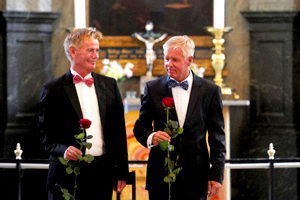 What is Marriage? - It's an odd question, if you think about it.
What is Marriage? - It's an odd question, if you think about it.
Consider. As same sex couples plea to be allowed to marry, and others oppose them, both sides seem - merely by doing so - to have a fairly clear understanding of the right itself.
And where this right has been granted, it has been excercised, and gay couples are living married lives without any apparent confusion about how to do it.
Indeed, what of all the straight couples who have married throughout human history, all without the benefit of the definition offered in What is Marriage? If the reality of their marriages - the lives they've actually lived - don't meet its definition, are we to side with the theory, and consider them frauds, never having been "really" married at all?
A simple logical point is at issue here. Marriage is a real social phenomenom. There's only one way to find out What is Marriage?: to study actual marriages, past and present.
This would undoubtedly turn up all sorts of different relationships: from the married siblings of ancient Egyptian royalty, through Richard II's marriage to the six year old Isabella, to the polygamous marriages of some modern splinters of the Mormon church.
The point is that What is Marriage? cannot be answered by stoutly expressed opinion: not even the stoutly expressed opinions of university professors, or wannabe professors.
Neither can it be answered from "first principles", through the application pure logic. Marriage is not a mathematical proposition or problem in set theory, it's an actual human behaviour. The only way to know what it is, is to go and look.
This, the writers simply do not do. As a result, though they would have you believe they have somehow established some kind of objective, transcendent "fact" about what marriage is, they have done nothing of the kind. You can't discover the nature of marriage through pure logic any more than you can discover the nature of rice pudding through calculus.
In truth, though they avoid this title in their desperation to sound objective, scientific, and non-judgemental, what really interests the writers is "What should marriage be?".
It's not a small point, but an example - right there on the front page - of how theology and religious moralising (What should marriage be?) are increasingly disguising themselves as objective, ideologically neutral, social and scientific research (What is Marriage?).
However, even the question "What should marriage be?", while closer to their intent, causes them problems.
Any question which asks "should" in this way is ultimately asking about ethics, about what is good and bad.
 There are different ideas about ethics: about what makes things good and bad. Humanist theories tend to focus on human happiness: things are good if they feed the hungry, free the oppressed, cure the sick, and so on. There are different flavours to these theories, but they are consequentialist. What makes our behaviour good or bad is the effect it has on others.
There are different ideas about ethics: about what makes things good and bad. Humanist theories tend to focus on human happiness: things are good if they feed the hungry, free the oppressed, cure the sick, and so on. There are different flavours to these theories, but they are consequentialist. What makes our behaviour good or bad is the effect it has on others.
And of course many Christian teachings, particularly those of Christ himself (though less so those of the Old Testament & of Paul) sound similar. But Christians have a fundamentally different idea of what makes something good.
It is very simple: good is what god says it is. Good is expressed by his laws, and by everything he does.
For this reason, Christians often argue that when things seem to have been designed by god to work a certain way, then it must have been his intention that they work that way, and so that is the way they should work.
If you accept their premises - if you believe in a good, all-powerful god - this argument makes a sort of sense.
However, if you don't, then you have absolutely no reason to accept it. Evolution is not "good", it is not conscious at all. The natural world is what it is: where it behaves in a way which helps people, by (say) growing apples which are good to eat, that's great, we'll eat them and encourage further growth. But where it is frankly inconvenient, as in giving us insufficient natural insulation to stay warm, we'll say stuff nature, and invent and wear clothes.
All of this poses a serious problem for What is Marriage?, because it claims its argument is not based on religion at all, but on purely secular grounds.
But, as you will learn, the central argument in What is Marriage? is absolutely based on the idea that what is suggested by nature is inherently good - indeed, it is a spectacularly crude form of this argument. I won't spoil the surprise of what the argument actually is - we'll work through its logic first - but when you get there, remember, in theory, What is Marriage? claims not to assume nature expresses the will of a good god.
The Language
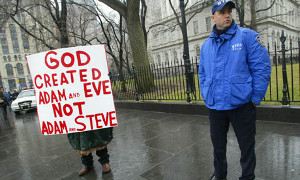 The language of What is Marriage? meets all the formal requirements of English, without actually quite being it.
The language of What is Marriage? meets all the formal requirements of English, without actually quite being it.
The style is simply odd: almost always wordy, but somehow still shiftily vague. In the very first paragraph we read...
"The spouses seal (consummate) and renew their union by conjugal acts – acts that constitute the behavioral part of the process of reproduction, thus uniting them as a reproductive unit."
Erm... "Constitute the behavioural part of the process of reproduction..."? Why don't they "...seal their union by having sex"? Or, if only sex for the purpose of reproduction is meant, why not "...seal their union by having sex in order to have children"?
Well, because either of these clear meanings would be fatal to their argument. Remember, What is Marriage? was written to oppose gay marriage.
So...
If it's just sex, well, gay couples have sex, so they can marry. That's no good.
But...
 If it's sex only for reproduction, that would exclude not just gay people, but lots of straight people - who are infertile simply by fluke of body chemistry, or by injury, or age, or disease, or as a result of surgery... That's no good either.
If it's sex only for reproduction, that would exclude not just gay people, but lots of straight people - who are infertile simply by fluke of body chemistry, or by injury, or age, or disease, or as a result of surgery... That's no good either.
To avoid both horns of this dilemma, What is Marriage? tries to hint at a nebulous third meaning, which somehow does the impossible of defining marriage by reference to reproductive sex, but without excluding marriages between straight couples who don't, or can't, actually reproduce.
And so the weird style is not just bad writing. It's the result of trying to twist language to say the self-contradictory without contradicting itself.
The writer obviously doesn't find it easy. As I read, an image formed in my mind of his hands hesitating over his computer keyboard, his lips lightly compressed, as he contrived to steer sentences between saying X and saying Not X - his face that of a man carefully trying to nail jelly to the ceiling...
The Logic
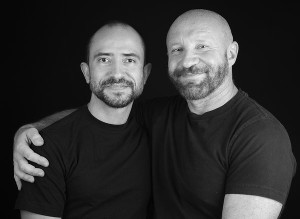 What is Marriage? argues as follows: marriage can only truly unite one man and one woman into "one flesh" because...
What is Marriage? argues as follows: marriage can only truly unite one man and one woman into "one flesh" because...
"Individual adults are naturally incomplete with respect to one biological function: sexual reproduction. In coitus, but not in other forms of sexual contact, a man and a woman's bodies coordinate by way of their sexual organs for the common biological purpose of reproduction."
So sex for reproduction, not other sex, is the hallmark of marriage. But if it is that plain, what of childless couples?
"By extension, bodily union involves mutual coordination toward a bodily good – which is realized only through coitus. And this union occurs even when conception, the bodily good toward which sexual intercourse as a biological function is oriented, does not occur."
In other words, even sex for reproduction doesn't always lead to pregnancy: but it's the thought that counts, eh?
Is that what this means, though? What of infertile couples - where such a pregnancy couldn't possibly occur?
"Again, this is not to say that the marriages of infertile couples are not true marriages. Consider this analogy: A baseball team has its characteristic structure largely because of its orientation to winning games; it involves developing and sharing one's athletic skills in the way best suited for honorably winning (among other things, with assiduous practice and good sportsmanship). But such development and sharing are possible and inherently valuable for teammates even when they lose their games."
Here an infertile couple are compared to a baseball team who "lose their games" (ie. don't get pregnant) - but are still a real baseball team (ie. a real married couple).
It's a dizzying concept, but let's run with it.
The problem is... with our infertile couple, we're not talking about a team which loses a few games, or even all of them. We're talking about a baseball team which can't possibly win, and will never win. What kind of baseball team is this? A team without bats? Without arms? Without any knowledge of baseball?
What kind of team is literally incapable of winning a game of baseball, and yet has an "orientation to winning games"?
 A team of hamsters someone has conditioned to expect hamster food inside baseball trophies, and then inexplicably squeezed into tiny Princeton Tigers baseball uniforms?
A team of hamsters someone has conditioned to expect hamster food inside baseball trophies, and then inexplicably squeezed into tiny Princeton Tigers baseball uniforms?
Is there a single baseball team anywhere in the world the writer could nominate as somehow a "real baseball team", who are "oriented towards winning", but for whom it is literally impossible to ever win a single game of actual baseball?
Believe it or not, they really have hung their entire argument on finding one. Without it, the whole theory collapses, and they have to either admit infertile couples are not really married, or gay couples can be.
And frankly, if reproductive sex is required for "real marriage", the infertile couple is as much a "real" married couple as small furry animals in baseball caps are a "real" baseball team.
(Please note, incidentally, that I mean no disrespect to infertile couples. Unwanted infertility breaks hearts, and I don't accept for a second it invalidates marriage, because I don't think love or marriage are defined by reproductive sex. But the writers of What is Marriage? do, and it is their logic I must follow.)
However, What is Marriage? is determined, as ever, to nail this jelly of an argument to the ceiling of reality.
"Infertile couples and winless baseball teams both meet the basic requirements for participating in the practice (conjugal union; practicing and playing the game) and retain their basic orientation to the fulfillment of that practice (bearing and rearing children; winning games), even if that fulfillment is never reached."
Get this. The infertile couple "retain their basic orientation to the fulfillment of ... bearing and rearing children".
The infertile couple can't have children. They know they can't have children. They aren't having sex in order have children because (and I don't know if I've mentioned this) they can't have children. They must therefore be having sex for fun. And good luck to them.
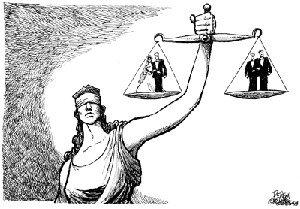 But to anyone who is trying to paint gay marriage as "not real" on the grounds that gay couples can't have sex with the aim of reproduction, but without telling millions of straight, Christian, married couples that this means they're not married either, this obvious reality can't be admitted.
But to anyone who is trying to paint gay marriage as "not real" on the grounds that gay couples can't have sex with the aim of reproduction, but without telling millions of straight, Christian, married couples that this means they're not married either, this obvious reality can't be admitted.
And so something which makes it sound like infertile couples are, in some mysterious, transcendent way, having sex to have children must be said, without actually saying it.
That's because to actually say it would be so immediately and obviously stupid that the Microsoft Paperclip would probably point it out. (BING! "You seem to be suggesting that couples knowing themselves to be infertile are having sex to have children... would you like me to display the definition of 'infertile'?").
So the attempt to say it without saying it twists the sentence into a formulation so baroque that it doesn't seem to mean anything at all. What does it mean for an infertile couple to have sex with "a basic orientation to the fulfillment of bearing and rearing children"?
"Though infertile, Philip and Jane were deeply in love, and never tired of expressing it physically. They made love in their cosy bedroom, on the kitchen table, and on one memorable occasion, in the Chilled Meats department of the all-night Tesco: but being firm believers in marriage, THEY ALWAYS DID IT WITH A BASIC ORIENTATION TO THE FULFILLMENT OF BEARING AND REARING CHILDREN."
In the name of Christ, who - whatever arguments there may be about him - never talked drivel like this, how do we distinguish between...
1. Sex which can't result in pregnancy but which is "orientated towards the bearing and rearing of children"
2. Sex which can't result in pregnancy but which isn't "orientated towards the bearing and rearing of children"?
They have an answer to this question. This answer is the core of their case:
"To form a real marriage, a couple needs to establish and live out the kind of union that would be completed by, and be apt for, procreation and child-rearing."
The only problem is that you could read it several times and be forgiven for not having the faintest idea what it meant.
The Answer
To break the code, and finally discover what makes marriage real, let's take this sentence bit by bit.
"To form a real marriage, a couple needs to establish and live out the kind of union..."
This means they must have a particular kind of sex. Remember the quote way up above? "Individual adults are naturally incomplete with respect to one biological function: sexual reproduction."
"...that would be..."
"Would be" if what? What is the condition behind this conditional? Well, remember the argument: the point being tackled is that this definition excludes gay couples, but not infertile straight ones. So the "would be" means "would be (if they weren't infertile)".
"...completed by, and apt for, procreation and child-rearing."
So what kind of sex, if a couple weren't infertile, would be "apt for procreation"? Well, in case your parents never told you, the man has to put his penis in the lady's vagina.
And so what does this definition of a real marriage boil down to?

To form a real marriage, a couple's sex life must involve a man putting his penis in a lady's vagina.
Why?
Because even if they can't make babies, that's how babies are made.
That's it. That's the argument. That is the Theory of Homophobiology.
Not that there's not a lot else in this little work. It goes on to discuss why the state should only support "real" marriage, why "unreal" marriages really do diminish the value of "real" marriages, why "real" marriages help children and society...
...but when you realise that "real marriage" means - purely and simply, this is the argument - marriages where a man puts his penis in a lady's vagina, all the rest becomes a loud, pompous parade put on in the desperate hope that the noise will drown out a central argument which could have been written by a five year old.
The Reply
Am I being unfair, reducing all their fine words to such a vulgar expression?
Well, if what offends you is the vulgarity, that's mine, blame me.
But if what offends you is the idea itself, that's theirs: making it vulgar just made it clear.
My best service to the writers of What is Marriage? would be to pass on the advice of the Christian thinker I admire most: C. S. Lewis. I agree passionately with half of what he says, and disagree just as passionately with the other half, but all of it is argued with honesty, humanity, and (perhaps above all) clarity.
"You must translate every bit of your Theology into the vernacular. This is very troublesome and it means you can say very little in half an hour, but it is essential. It is also the greatest service to your own thought. I have come to the conviction that if you cannot translate your thoughts into uneducated language, then your thoughts were confused. Power to translate is the test of having really understood one’s own meaning. A passage from some theological work for translation into the vernacular ought to be a compulsory paper in every Ordination examination.” (from "God in the Dock")
 To everyone else, I would ask you to note the weird reversal which has happened in the world. There was a time when materialists, atheists, secularists, liberals, leftists, gay people and the assorted legions disliked by the conservative wing of the church were condemned as cynically immoral, wading through a mire of promiscuity, hedonism and excess, dead to the spiritual virtues, to kindness, to love.
To everyone else, I would ask you to note the weird reversal which has happened in the world. There was a time when materialists, atheists, secularists, liberals, leftists, gay people and the assorted legions disliked by the conservative wing of the church were condemned as cynically immoral, wading through a mire of promiscuity, hedonism and excess, dead to the spiritual virtues, to kindness, to love.
Now? Gay people - with the support of all the assorted ungodly I mention above (and some of the nicer godly) - are fighting for the right to make the same public, serious, and consequential social commitment to a tender, monogamous, loving, and hopefully lifelong marriage. Some want to raise children, for a chance to extend their circle of love not only to each other but to someone else who needs it, and to play a part not only in today's society, but in shaping tomorrow's. They want to establish homes, links of love joining not only joining their own little family, but their respective wider families, as marriages have always done. They are pleading they can care, nurture, nest, build, and love, exactly as straight people do.
 And the reply of fundamentalist Christianity, and of the Homophobiologist?
And the reply of fundamentalist Christianity, and of the Homophobiologist?
"No, marriage isn't about all that. It's about penises in vaginas."
Manny
 www.mannyneira.com
www.mannyneira.com






























